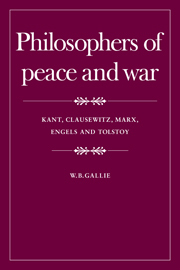Summary
The chapters which follow deal with a handful of writers whose thoughts on peace and war have never, to my knowledge, been previously brought together for comparison, analysis and assessment. Except in one instance, their influences upon one another, although of interest, were not of the first importance. My authors form not a school, nor even a clear succession or progression of thought about peace and war; they form, rather, a constellation, a number of neighbouring sources of intellectual light converging upon, and suggesting the outlines of, the most urgent political problems of our age. As much by the differences in their approaches and conclusions as by the similarities and overlaps of their teachings, they help us to collect our thoughts, to begin to unify our still usually separate lines of thinking, about the roles and causes of war and the possibilities and conditions of peace between the peoples of the world: an enterprise which the ablest minds of previous ages had, with very few exceptions, either ignored or by-passed, and which researchers of our century, despite all their scientific and philosophical advantages, have done sadly little to advance.
Until the eighteenth century, international politics – centred on the use of the threat of war and expansion of commercial and cultural contacts – hardly admitted of systematic study: the contacts and conflicts of peoples and governments were too sporadic, variable and ill-recorded to admit of generalised description, still less of systematic prediction and control. But during the eighteenth century the future commercial unity of this globe was beginning to be recognised, as was the ever increasing cost of wars between the European powers – a cost that was to be measured not only by rising taxes but by the perpetual postponement of much needed constitutional reforms.
- Type
- Chapter
- Information
- Philosophers of Peace and WarKant, Clausewitz, Marx, Engles and Tolstoy, pp. 1 - 7Publisher: Cambridge University PressPrint publication year: 1978

